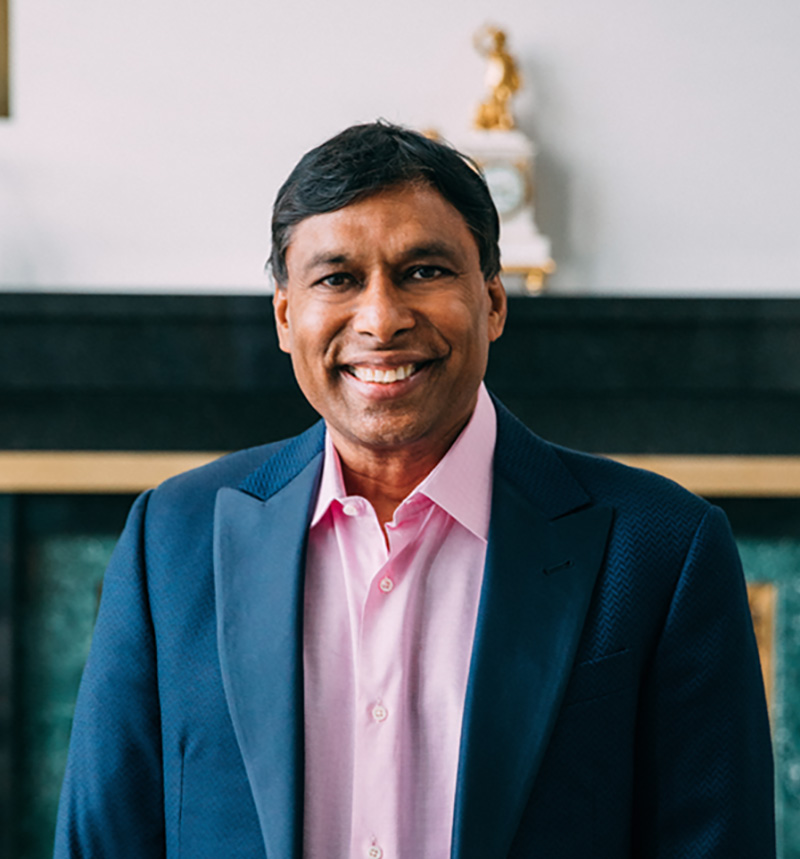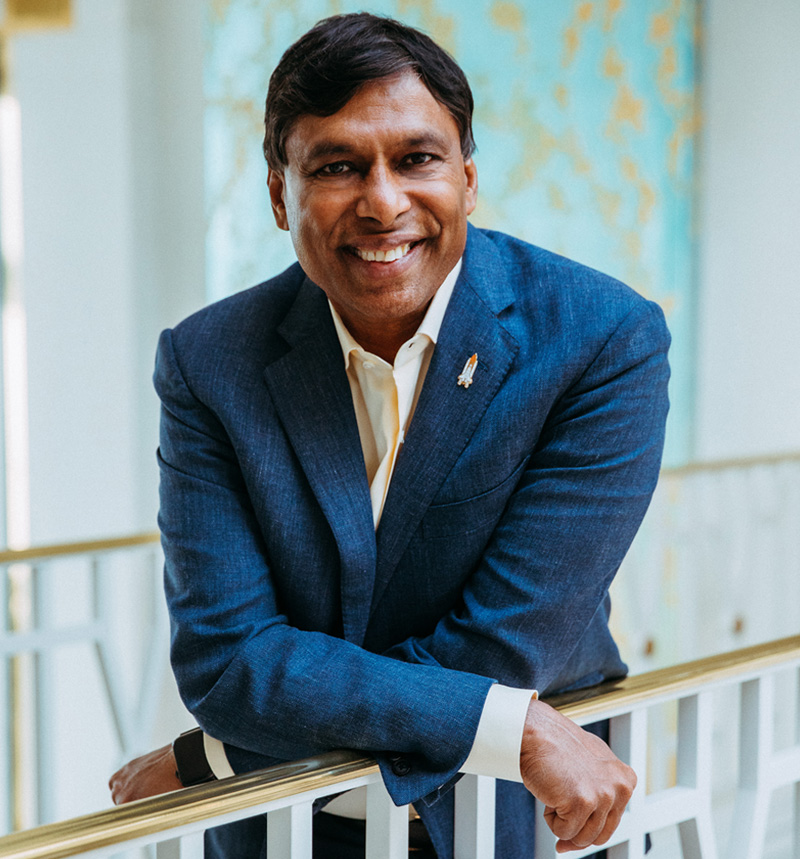From the exec suite: Q&A with X PRIZE’s Naveen Jain
This is the first interview in an ongoing series on innovative thinkers and business leaders. Firstpost will explore technical expertise to a lesser degree and focus instead, on what makes them outstanding leaders.
Over the course of a 30-year career, billionaire serial entrepreneur Naveen Jain has ridden the roller-coaster of starting and running a range of technology enterprises.
Though he’s still at the helm of Intelius, a public information service, and he recently cofounded a lunar data and transportation company called Moon Express,Jain is now focusing the bulk of his attention on what he calls “philantroprenuership,” or philanthropy that solves societal challenges through entrepreneurship.
As a donor and trustee to the X PRIZE Foundation, an organisation that funds projects addressing significant societal issues, Jain is helping to launch a number of seven-figure cash prizes aimed at improving health care and education worldwide. He has already donated $1 million to the “Digital Doctor” X PRIZE, an award for the creation of an artificial intelligence system that diagnoses illness in places where there are few doctors. The second phase of the health care competition will award $10 million to the entrepreneur who creates the best mobile patient diagnostic tool. The yet-unnamed education X PRIZE will focus on improving student learning, and it comes with a cash purse of $1-10 million.
Jain and fellow X PRIZE trustee Ratan Tata are also spearheading the launch of an X PRIZE India office later this year. The India prizes will be go to those who can identify and find responses to the country’s most pressing issues.
Jain spoke to Firstpost about his path to the United States, what it means to be an entrepreneur, and the secret to making lots of money.
Tell me about your path from India to the United States.
I grew up in India in quite a poor family, and the thing is we didn’t have to be poor. My father was an engineer in the public works department, the government agency that is supposed to build roads and buildings. In those days, if he was to make $100 a month, they will pay you $10 and you are supposed to take the other $90 in bribes. My dad, in his humble wisdom, decided that he wanted to be an honest man.
Since he was at the lowest level, if he didn’t take the bribe, his bosses don’t get their money. Every nine to 12 months, they would figure out that [my father] was not sending the money up and they kept shipping us to more and more rural areas. So most of my education ended up in schools where there were no chairs, no tables, and you ended up sitting on the floor or writing on some small slate.
Despite all of that, my older sister ended up doing her doctorate, my brother ended up getting a PhD, and I am the least-educated person in my family for attending IIT Roorkee for an engineering degree and XLRI, Jamshedpur for my MBA. My mother never went to school, but it didn’t stop her from making sure that we get an education because she realised that the only way to get out of poverty is through education. Fundamentally what she realised is that if the family values education, you get education.It’s not about income; it’s not about your parents being educated.
I came to this country 30 years ago, and I think I had $20 in my pocket. I came to this country on a training for a year. We were making $500 a month or something. We came to New Jersey and five of us shared this small farmhouse. We had an old Chevrolet Impala.
I started my life in New Jersey then went to Silicon Valley for several years, I got married in 1988, and we moved to Seattle in 1989.
Was the training for a job that you had here or a job that you planned to return to India for?
Well, when I was finishing my MBA, there was a company that became Unisys. They came to the campus and they would normally interview people. A couple of my friends who had applied [for a job] came to me and said, “This is the hardest aptitude test we have ever taken,” and I said, “How hard can this thing be?” So I went and did the test and I did very well. I got a call the very next day and they said they would like to interview me for a job for computer programming. I told them I have never seen a computer, forget about programming one! But they thought they could train me and I said, “Look, if you think you can train me, I can be trained.”
That’s quite a transition. You’ve been an entrepreneur for 15 years. What does it take to be a successful entrepreneur?
You have to be absolutely passionate about what you are doing because your passion also is contagious. As an entrepreneur starting off, you really have nothing. You just have a vision and an idea and people have to believe in that. But a successful entrepreneur always takes that loyalty and passion and converts that into a passion for a cause.
The next thing is focus. One of the beautiful things about an entrepreneur is that the entrepreneur sees opportunities when others see none. That means an entrepreneur is always seeing new opportunities, and what they don’t realize is that more companies die from indigestion rather than starvation. That means you have to focus on a few things and do them well.
I think a lot of people think an entrepreneur means somebody who starts a business. I always felt the entrepreneurship is not about starting a company; it’s really a state of mind, and when you see a problem, you think of a solution and then you go execute on it. An entrepreneur is somebody who solves a problem. Ultimately it’s not about the vision, and it’s really about the execution because everybody has great ideas.
And in my book, there’s nothing more important than being honest and having integrity. You have to always be true to yourself and to the community that you live in. Every company that I have started, we give a piece of revenue to good causes. We donated in excess of $2.5 million last year to various charities personally. Intelius also is consistently in the top 20 philanthropic organisations in our communities.
When it comes to your “philantroprenuer” work, how do you decide which issues you are going to focus on?
I look at them and say, “What are the biggest challenges facing humanity and are these problems that we can solve using science and entrepreneurship?”
What is your advice for young entrepreneurs?
Follow your passion and your dream. Enjoy the journey, work hard, be honest, and build a great team around you. My only caution would be that most people tend to like the people who are just like them. That’s really good when you are hanging out at the bar but when you are building a company, you want people who are very unlike you because you need complementary skills.
Behind every overnight success, there’s years and years of hard work that goes into it. You have to enjoy the journey of being an entrepreneur. You can’t start a company or be an entrepreneur thinking, “I’m going to do an IPO where I want to make a lot of money.” Making money is really the byproduct of doing things that you really enjoy doing.
Looking back and the ups and downs of your career, how do you define success?
Success is so personal and for most people, success really means: Are you happy? Do you feel that you have achieved what you set out to do? If you say, “What if I made $1 million or $10 million,” then you can see your success or failure. But if you simply say, “My purpose in life really is to impact society,” how do you succeed or fail when you still have billions of people who are suffering?
The point is it is a journey. There will always be enough left to do. I am just at the beginning of the journey and my hope is that my success will be what I leave behind. In some sense, all of us are always looking to see how we can improve the world for our children, right? Very few of us ever realise that what’s most important is that can we leave better children for our country, not just a better country for our children.
http://www.firstpost.com/business/from-the-exec-suite-qa-with-x-prizes-naveen-jain-12062.html



